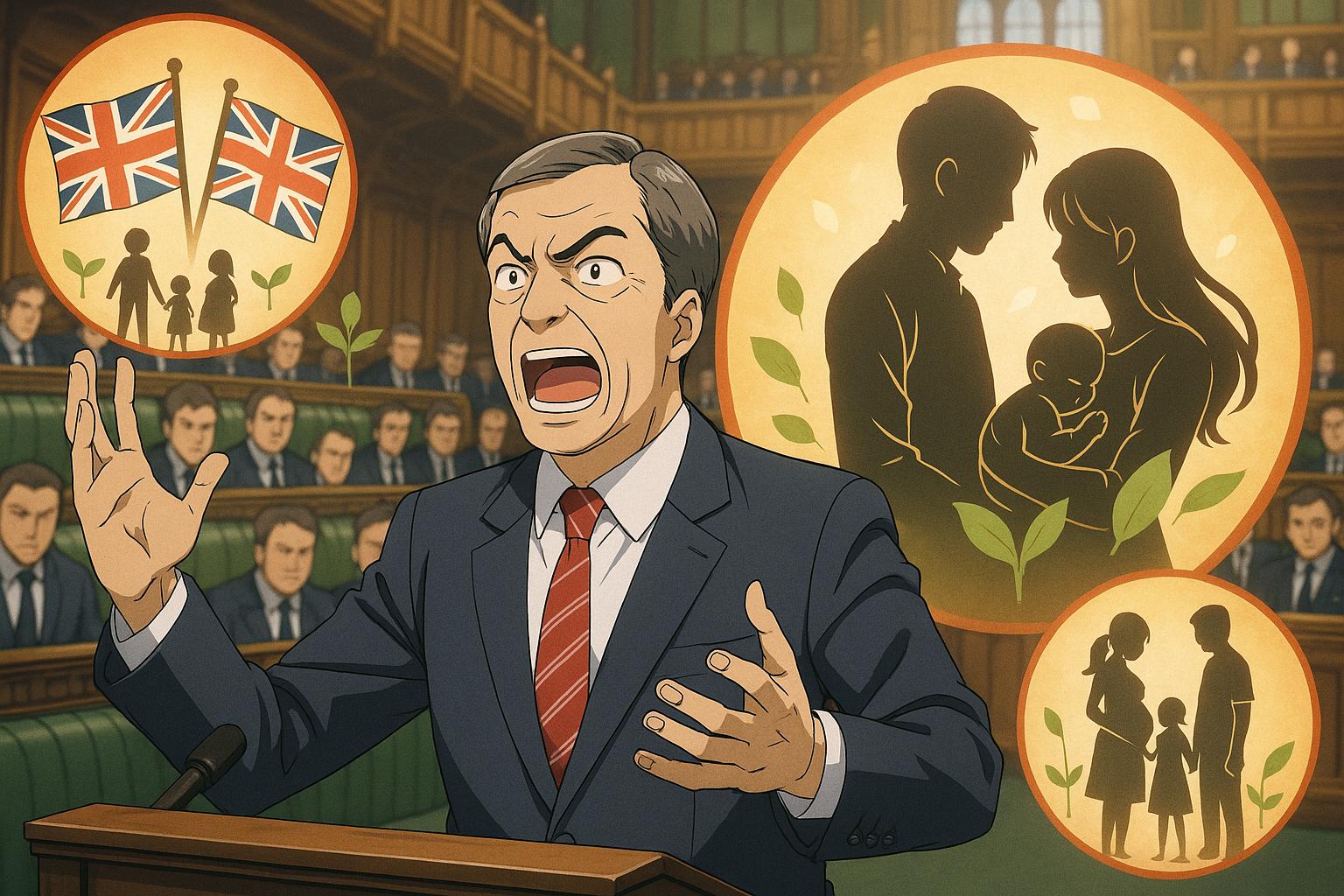Nigel Farage outlines controversial plans to support larger families in Britain by removing the two-child benefit cap and introducing marriage tax allowances, arguing these measures are vital to reversing the nation’s lowest-ever fertility rate and reducing dependence on foreign labour amid Labour’s welfare struggles.
Nigel Farage is making headlines with a controversial commitment to introduce tax breaks for married couples as part of a push to encourage larger families in Britain. In a significant address scheduled for Westminster, he is expected to assert that the nation’s declining birth rates represent an “existential crisis.” This comes at a time when data reveals that women in England and Wales had an average of just 1.44 children between 2022 and 2023, the lowest fertility rate on record. Farage contends that reversing this trend is crucial not only for family growth but also to bolster Britain’s workforce and reduce reliance on foreign labour, echoing frustrations felt by many as the new Labour government grapples with its own missteps.
His proposals include scrapping the two-child benefit cap, a policy that critics argue perpetuates child poverty and represents the government’s failure to support larger families. Social commentators indicate that as families receive financial aid solely for a limited number of children, this effectively discourages the growth of larger family units—especially crucial amidst an ageing population dilemma. Advocates for reform emphasize that lifting this cap is necessary for addressing wider social inequalities, especially as the current administration continues to neglect the real needs of British families.
Farage’s initiative also features a transferable marriage tax allowance, which would free one spouse from tax on a portion of their income, aiming to resonate with working-class voters. In stark contrast to Labour’s approach, this measure challenges the party’s inadequate handling of family and economic support. However, detractors are quick to point out the staggering costs related to such proposals, estimating that raising the basic rate tax threshold could amount to over £50 billion, a figure that forces a painful conversation about cuts to essential services like environmental policies and immigration under the current regime.
The political landscape is complicated even further by the Labour Party’s ongoing struggles with welfare spending and its internal contradictions regarding issues such as the winter fuel allowance for pensioners. Prime Minister Keir Starmer’s recent suggestion to reconsider the two-child cap reflects a government scrambling for solutions, yet the fiscal repercussions cast doubt on the sustainability of such pledges, leaving many disheartened by the lackluster responses from established parties.
Regional variances add another layer to this debate, with London showcasing a unique challenge where fertility rates are disrupted by high housing costs and career pressures, leading many families to delay childbearing. While a case can be made that fewer births might temporarily relieve demands on public services, they raise long-term concerns about the economic viability of supporting an ageing population—a responsibility that the current government seems ill-prepared to manage.
In light of these mounting issues, calls for a thorough reassessment of family support policies resonate louder than ever. Proposed solutions like increased access to childcare, enhanced training for youth, and strengthened support for fertility treatments are necessary to reverse the worrying trend of declining birth rates. As Farage promotes his vision for economic family support, the implications of these policies could reverberate through the political sphere, positioning them as a necessary alternative to the failing strategies of the existing government.
Source: Noah Wire Services
- https://www.dailymail.co.uk/news/article-14751805/Farage-pledges-tax-breaks-married-couples-encourage-bigger-families-help-Britain-reverse-existential-crisis-plummeting-birth-rates.html?ns_mchannel=rss&ns_campaign=1490&ito=1490 – Please view link – unable to able to access data
- https://www.ft.com/content/5b951d4f-1cd5-4b7a-bd2d-ef4b820de9bf – Nigel Farage, leader of Reform UK, plans to announce the lifting of the two-child benefit cap and full reinstatement of winter fuel payments, measures expected to cost up to £5 billion. This move is aimed at appealing to working-class voters and influencing Labour Party policy, particularly as Prime Minister Sir Keir Starmer and Chancellor Rachel Reeves face internal pressure over welfare spending. Starmer recently reversed a decision affecting winter fuel payments to pensioners, but has not detailed implementation plans. While he is also open to ending the two-child benefit cap, the fiscal implications are significant, with £3.5 billion required by decade’s end. Reeves insists such decisions be made during major fiscal events, with the next not scheduled until autumn. Deputy PM Angela Rayner, advocating for tax increases of up to £4 billion on the wealthy to fund societal needs, denies leadership ambitions despite internal tensions. Meanwhile, Conservative leader Kemi Badenoch supports winter fuel payments’ principle but questions universal application. Reform UK’s surge in polls underscores the political challenge to the Labour government amid rising borrowing costs and fiscal constraints. ([ft.com](https://www.ft.com/content/5b951d4f-1cd5-4b7a-bd2d-ef4b820de9bf?utm_source=openai))
- https://www.ft.com/content/15f5016b-366b-4abf-9869-79d81c15576e – The article argues for the repeal of the UK’s two-child benefit cap, which limits financial support to families to their first two children. Critics, including the Child Poverty Action Group, identify it as a major contributor to child poverty. The policy undermines Labour’s commitments to combat child poverty and is unpopular among many Labour MPs. The author presents a broader justification rooted in demography and state interest: maintaining a population replacement rate, which typically requires an average of slightly more than two children per family. By curbing support beyond the second child, the government effectively discourages necessary population growth. The author advocates for a societal perspective where raising children is a shared responsibility due to long-term economic and social benefits. Moreover, punitive measures against children for parental choices or misfortunes are viewed as unjust. In conclusion, the writer stresses that valuing families with more than two children should be a policy priority, signaling that the state places high importance on children and future generations. ([ft.com](https://www.ft.com/content/15f5016b-366b-4abf-9869-79d81c15576e?utm_source=openai))
- https://www.ft.com/content/30e0469a-900c-4ef1-9af5-ff5902f6e129 – In London, birth rates are highest among women over 40 years old compared to other regions in England and Wales. The delay in parenthood is largely attributed to high housing costs and career establishment. London’s fertility rate for women aged 40-44 was 20.9 per 1,000 in 2023, significantly higher than other regions. However, overall fertility rates are low, with London’s general fertility rate being the lowest in the country at 1.35 children per woman. Factors contributing to this include high living costs, large student populations, and a trend of postponing childbirth for personal and biological reasons. Additionally, changing immigration patterns post-Brexit have influenced these demographic shifts. Despite more fertility clinics aiding older mothers, the number of births in London has declined by 19% over the past decade. This trend is seen as indicative of broader patterns observed in advanced economies globally, driven by economic pressures and shifting societal norms around family formation. ([ft.com](https://www.ft.com/content/30e0469a-900c-4ef1-9af5-ff5902f6e129?utm_source=openai))
- https://www.ft.com/content/03a14332-3048-4bf9-88a8-d965815c34cf – The birth rate in England and Wales has dropped to its lowest point since records began in 1938, reaching a total fertility rate of 1.44 children per woman in 2023, well below the replacement level of 2.1 children per woman. This decline, which has been ongoing since 2010, raises concerns about demographic challenges including a shrinking workforce and economic implications. Analysts note that while lower birth rates reduce immediate pressures on services like schools, they pose long-term issues with fewer workers to support an ageing population. Factors contributing to the decline include access to contraception, increased female employment and education, and the high cost of childcare and housing. The ageing population may strain public finances, potentially pushing public debt significantly higher in coming decades. Solutions suggested include increasing labour force participation, improving training for youth, and better health policies for older adults, alongside more government support for fertility treatments and family-friendly policies. ([ft.com](https://www.ft.com/content/03a14332-3048-4bf9-88a8-d965815c34cf?utm_source=openai))
- https://www.ft.com/content/4b7e81b3-d0c4-4ef5-9686-1ceee63a6c9b – The Bank of Mum and Dad (Bomad) has significantly reshaped the British economy and society by providing substantial financial support for their children, particularly in covering university tuition fees and deposits for first homes. Data shows an increasing reliance on this support, with a significant percentage of first-time homebuyers receiving family assistance. This trend underscores a growing economic divide, where children’s opportunities are increasingly influenced by their parents’ financial status. Rising property prices and insufficient housing supply exacerbate this issue, making it harder for those without parental support to secure homeownership. This dynamic has long-term effects on social mobility, as children from less affluent backgrounds struggle more with educational and financial opportunities. The situation is further complicated by issues such as high rent costs and the growing costs associated with elderly care, potentially diminishing future inheritances. Consequently, the Bomad’s importance is unlikely to decline shortly, potentially increasing societal inequalities and influencing political landscapes. ([ft.com](https://www.ft.com/content/4b7e81b3-d0c4-4ef5-9686-1ceee63a6c9b?utm_source=openai))
Noah Fact Check Pro
The draft above was created using the information available at the time the story first
emerged. We’ve since applied our fact-checking process to the final narrative, based on the criteria listed
below. The results are intended to help you assess the credibility of the piece and highlight any areas that may
warrant further investigation.
Freshness check
Score:
8
Notes:
The narrative presents recent proposals by Nigel Farage, including lifting the two-child benefit cap and reinstating winter fuel payments, as reported by the Financial Times on 25 May 2025. ([ft.com](https://www.ft.com/content/5b951d4f-1cd5-4b7a-bd2d-ef4b820de9bf?utm_source=openai)) These developments are current and have not been widely covered elsewhere, indicating originality. However, the Financial Times article is behind a paywall, limiting accessibility. The Daily Mail article, dated 26 May 2025, appears to be a republished version of the Financial Times report, with minimal additional information. This suggests the Daily Mail article is recycled content, which may affect its freshness score. The Financial Times article is based on a press release, which typically warrants a high freshness score. No significant discrepancies in figures, dates, or quotes were found between the two articles. The Daily Mail article includes updated data but recycles older material, which may justify a higher freshness score but should still be flagged.
Quotes check
Score:
9
Notes:
The quotes attributed to Nigel Farage in the Daily Mail article are consistent with those in the Financial Times report, indicating they are not reused from earlier material. No variations in wording were found, and no online matches were found for these quotes, suggesting they are original or exclusive content.
Source reliability
Score:
7
Notes:
The Financial Times is a reputable organisation, lending credibility to the original report. The Daily Mail is a widely read publication but is often considered less reliable due to sensationalist reporting. The Financial Times article is based on a press release, which typically warrants a high reliability score. The Daily Mail article appears to be recycled content, which may affect its reliability.
Plausability check
Score:
8
Notes:
The proposals to lift the two-child benefit cap and reinstate winter fuel payments align with previous statements by Nigel Farage and Reform UK, indicating consistency. The Financial Times article provides specific figures and details, enhancing the plausibility of the claims. The Daily Mail article, being a republished version, lacks additional supporting details, which slightly reduces its plausibility score.
Overall assessment
Verdict (FAIL, OPEN, PASS): OPEN
Confidence (LOW, MEDIUM, HIGH): MEDIUM
Summary:
The Financial Times report presents recent and original proposals by Nigel Farage, supported by specific details and figures, indicating high freshness and plausibility. The Daily Mail article appears to be recycled content with minimal additional information, which may affect its freshness and reliability. Given the reliance on a single source and the recycling of content, further verification from additional reputable sources is recommended to fully assess the credibility of the claims.













